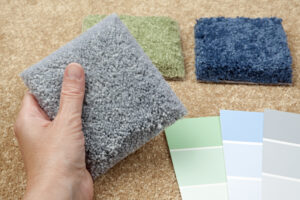What Flooring Is Best for a Finished Basement ?

As experienced basement remodelers, one of the most frequent questions we encounter is: “What flooring is best for a finished basement?” Below, we compare two popular flooring choices, sharing pros and cons based on our expertise.
Carpet
Carpet is a popular choice for basements, offering a softer and warmer feel. Here are some pros and cons to consider:
Pros:
- Soft Surface: Ideal for families who enjoy lounging on the floor.
- Minimal Floor Prep: Carpet can mask imperfections in concrete slabs, which are often not perfectly flat.
- Warmth: Provides insulation, combating the cooler temperatures of finished basements.
- Budget-Friendly: Available in various grades, generally costing less than other materials.
- Quick Installation: A 1,000 sq. ft. basement can be carpeted in just a few hours.
Cons:
- Difficult to Clean: Although some high-grade carpets repel stains, cleaning can still be a challenge.
- Water Damage: Carpets can soak up water from leaks, often leading to severe damage or the need for replacement.
- Aesthetic Limitations: May not provide the luxurious feel of other floor types.
- Odor Retention: Basements often have higher humidity levels, and carpets can hold onto smells if air quality is not properly managed.
- Allergens: Carpets can harbor allergens and dust mites, making them unsuitable for some.
Vinyl Plank (LVP)
Luxury Vinyl Plank (LVP) is another excellent option, providing a refined look and making the basement feel like an extension of your home.
Pros:
- Aesthetic Appeal: Offers the appearance of real wood or tile, enhancing the space’s overall look.
- Easy Maintenance: Simple to clean with a dust broom and mop.
- Hypoallergenic: Does not trap allergens like carpets do.
- Odor Resistance: Does not retain odors.
- Quick Installation: A 1,000 sq. ft. area can be completed in one to two days.
- Versatile: Whether for play or leisure, the sturdy surface is ideal for a variety of activities.
Cons:
- Hard Surface: Not as comfortable for sitting or lying down.
- Temperature: The coldness of the concrete can feel evident through LVP.
- Floor Prep Requirement: Needs a flat substrate, as imperfections can lead to noticeable issues like seam separation or buckling.
- Water Concerns: Although marketed as “waterproof” it will have to be removed and re-installed if a major leak occurs to allow for proper drying.
- Cost: Not just the product, but the necessary floor prep can increase expenses.
- Durability Considerations: Varies by product; consult your supplier on durability before purchase. Generally LVP floors are known for being durable.
We hope this guide aids your decision-making process. For further questions or assistance, don’t hesitate to contact us at 856-939-1069 or fill out our contact form.


